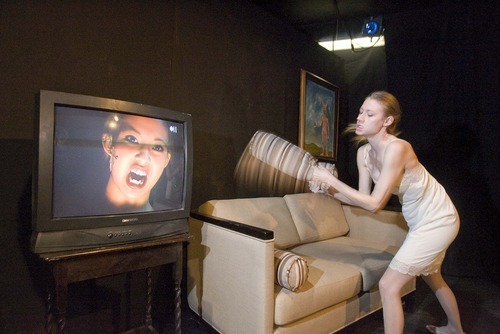This is an archived article that was published on sltrib.com in 2010, and information in the article may be outdated. It is provided only for personal research purposes and may not be reprinted.
"This is a joke, right? A nothing? A goof? None of this was ever written down!"
So yells Eurydice, as played by actor Rhiannon Ross, in the opening lines of Jeremey Catterton's "Go To Hell."
Any audience contemplating an evening with Catterton's play, the inaugural production of local actor David Fetzer's New Works Theatre Machine, would be well within their rights to ask the same questions. Here, after all, is a woman deep in the bowels of hell. Chain-link hanging from the walls — all black, of course — and incessant moans of suffering prove it.
Any play that cross-pollinates the Greek myth of Orpheus and Eurydice with the late 1980s cult horror franchise of "Hellraiser" films and then promises "an entirely unique, terrifying, and utterly different evening of theatre" is sure to push the cynicism meter all the way to eleven.
The task of satisfying the jaded media tastes of those 18 to 35 years old, Fetzer's stated demographic in founding his new theater company, seems even more difficult considering the myriad zombie films and ultra-violent video games that target the age group. Any play that announces such bold expectations risks underwhelming its audience at almost every turn. Any play that threatens to scare you must be aware of its own limitations, lest the distinct smell of cheese permeates the stage.
Amazingly, "Go To Hell" succeeds on most fronts, even if it seems to beat a hasty retreat from its promised themes, and connects one too many dots across its jarring landscape of stage and video imagery. Like a good steak dinner, "Go To Hell" offers plenty of soul-stirring protein. You just have to chew through some tough meat and avoid the stray bit of gristle. If you're up for the challenge, Catterton's uncompromising yet playful style of drama is cooked to order.
After Ross' Eurydice drops scenic anchor in the location of the play's namesake, we see her and Orpheus (Tyson Brett) at an auction house. He's a Harvard student on scholarship. She's on scholarship as well, but for her skill as a gymnast.
After Eurydice wins the auction for a puzzlebox they both fancied, the couple turn to a quick bout of flirting that leads to a solid state of smitten bliss and, in no time at all, a contentious marriage filled with lacerating insults and industrial-sized portions of bitter regret and even open hatred. Hell, Catterton seems to say, is no metaphysical or religious construct but real enough when romantic expectations outrun reality. Hell, or at least human suffering, is also quite funny when you're so damned all that's left is laughter.
Similar to the mysterious box that split David Lynch's "Mulholland Drive" into two narratives when opened by that film's heroine, Eurydice's puzzlebox transports her between hell and her suburban living room. In hell, she's menaced by Hades (Chris Bradshaw) and his demonic minions Cerberus (Nina Dobratz) and Cenobite (Maren Nazera Erickson), who promise "legendary" sufferings. These scenes chill the eyes with just enough dramatic restraint, due in no small part to the sound design and music of Zach Dupaix and "Swet," respectively.
Back at home, Eurydice and husband Orpheus wage epic boy-girl fights and agonize over their marriage turned deadly sour. Leavening the proceedings is "Skull," the ferry man with a Bronx accent and bottle of endless vodka who rides from hell and back on a motorcycle. Actor John Kuehne relishes each of his character's monologues, chewing the fat at the edges of Catterton's broad themes of love and life with a delivery that expertly mixes the sordid, surreal and laugh-out-loud funny.
In the play's program notes, Catterton writes that soon after he received Fetzer's call to write the play, he wanted "a performance where a counter-culture audience may see and feel validation for living the lives they feel they deserve, and not be punished for it."
The range of dialogue and imagery on display here is too wide for such a narrow interpretation. If Catterton's aim was to pillory suburban mainstream life where kitchen counters make or break a marriage, he and his cast certainly succeeded, even if that critique has been leveled countless times before.
The dark secret of "Go To Hell" is that, despite its harrowing scenes and frequent shouting, and a conclusion that feels all too rushed, it's in fact quite soft at heart. If you want to recall those few moments in which your heart first opened, "Skull" reminds us there's no better place to do it than in hell. —
New Works Theatre Machine's 'Go to Hell'
An unbeatable drama for your red-air quality evening.
When • Reviewed Friday, Dec. 3; continues Thursday at 7:30 p.m., Friday and Saturday at 8 p.m. and Sunday at 7 p.m. through Dec. 18.
Where • Utah Pickle Factory, 741 S. 400 West, Salt Lake City
Tickets • $10-$30; at 801-916-1308 or http://www.thenewworkstheatremachine.com
Running time • 75 minutes, no intermission



